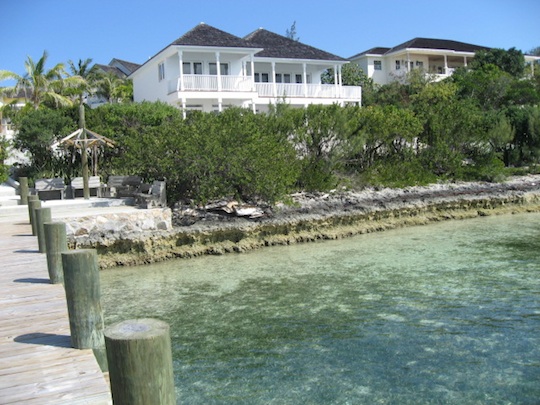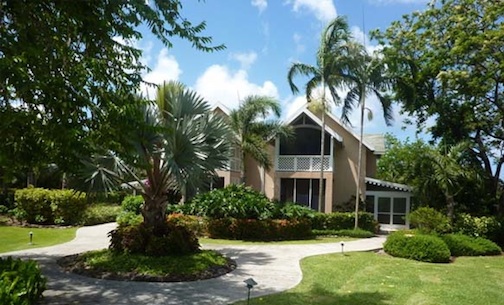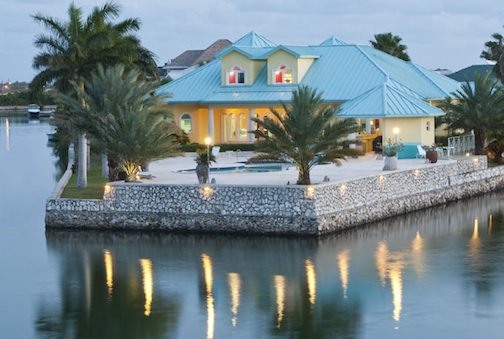Above: the “Happy Ours” home on Harbour Island in the Bahamas (Listing: Coldwell Banker)
While the Caribbean real estate market was impacted by the recession, it is beginning to show signs of growth. And at the centre of the regional market is Coldwell Banker Island Affiliates, the Caribbean master franchiser for global brokerage Coldwell Banker, with 40 brokerages across the region, from the Dominican Republic and Jamaica to the British and US Virgin Islands. To learn more about the state of the market, Caribbean Journal talked to Jim Reed, the managing director for Coldwell Banker Island Affiliates, about the effect of the downturn, the growth of foreign buyers and the outlook for the Caribbean in 2012 and 2013.
How much did the downturn impact the real estate market in the Caribbean?
“It varies from country to country. It seems like the more established older firms got hit a little harder, because their infrastructure had grown to the point where they had more expenses, so they probably suffered a little bit more than the guys that were more nimble during the downturn. Some countries have rebounded and done real well, some countries haven’t – it’s all over the plate.”
Where do you see the Caribbean market right now?
“Rebounding. I think there’s a bit of a bit of confidence coming back into the marketplace. I think everybody’s realized that we’re not going to go completely in the trash can. We’ve probably hit bottom, and are on our way back up.”
You mentioned the countries that are doing well. Are there any in particular that are performing better than expected?
“The Bahamas has done well; the Bahamas is in a unique geographic location. They’re very close to the US, they’re only 50 miles from Florida. So they’re very reachable, they’re very easy to get to. The Bahamas also draws from the UK, and Canada, so they’ve got pretty much a worldwide network of buyers.”
The US real estate market has see a large amount of investment from foreign markets like Latin America. Have you seen that demographic entering the Caribbean?
“Not really — no. Our market still hasn’t changed much. The islands that are closer in proximity to the US derive most of their buyers from the US and Canada. When you get out to the Eastern Caribbean, St Martin, Nevis, St Kitts, Barbados, those countries get more of their prospects from the UK and Europe.”
Above: a home for sale in Nevis (Listing: CB)
As far as the countries that not performing as well, what has to happen for them to see improvement?
“Our brokers are no different from anybody else. Nobody wanted to take this recession seriously at first, they thought it was a short-term thing, They didn’t realize it was going to be a global recession, and it still is. They kept waiting for the rich Europeans to come back with their money and buy second homes and retirement homes. That flat didn’t happen. Developers quit developing. The brokers who did well and rebounded sought new markets, and we were able to provide them with tools for them to exploit the local market and also the commercial markets.”
Above: the “Like a Rock” home on Grand Cayman’s Patrick’s Island (Listing: CB)
How interconnected are the tourism and real estate sectors in the Caribbean?
“That’s a really good question. There’s a connection of sorts, because, a lot of times, people who are thinking of a long-term investment will visit many islands at first. They show up as tourists off a cruise ship, to see if they like the island, the flavour of the island, to see if they feel like they could live there. And they’ll visit many places before they make a decision. So it is obviously interconnected. And then there are those people who get off the cruise ship and flat fall in love with the place and never come back. So that happens.”
We’ve seen increased investment from Asia in the Caribbean – have you sen that manifest itself in the residential real estate sector?
“Yes, we have. In particular, Curacao is one area that always tends to have a good influx of Chinese buyers or Asian buyers. But we’re seeing them throughout the Caribbean.”
How much has the industry itself, particularly brokerages, been impacted during the downturn?
“Well, we haven’t seen a whole lot of contraction. We’re still dealing with roughly the same agent base that we were five years ago. We haven’t seen lot of expansion either, People just aren’t expanding right now. But I think we lost one office throughout the recession, and that was a lease expiration that wasn’t renewed — they’re still in business, just elsewhere.”
What do you see going forward for the next half-year to year in the Caribbean?
“If I had the answer to that! I don’t have a crystal ball. The market is getting better all the time, there’s a lot of pent-up demand there. People have been sitting on their money for too long, it’s all in cash and securities and gold, and people are wanting to do fun things with it again, like lifestyle investments in foreign property. So i see that happening. I don’t see it happening on a mass scale, but I see it happening, in that direction.”
— CJ


